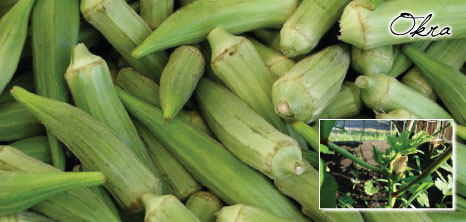|
OkraThis plant is by no means unfamiliar to Barbados as it serves as one of the main ingredients in Barbados' national dish, coucou and flying fish.
Okra plants grow all year round and are related to such species as cotton, cocoa and hibiscus and reach heights of up to 2 m tall. The leaves are broad with approximately 5–7 lobes. The flowers are 4–8 cm diameter, with five white to yellow petals, often with a red or purple spot at the base of each petal. The fruit is a capsule up to 18 cm long, containing numerous seeds.
Okras like any other plant should be washed thoroughly before usage as this ensures as much dirt and possible residual pesticide is removed. The crown and tips are then removed and
Cultivation ProcessOkra seeds are soaked overnight before they are sown. The process of germination takes between six days and three weeks to occur with seedlings requiring a suuficient amount of water.
The seed pods rapidly become fibrous and woody and must be harvested within a week of the fruit being pollinated to be edible. The fruits of the okra are harvested when immature and eaten as a vegetable.
Health Benefits of OkraOn the island of Barbados, we've been told time and time again by the older folks of the importance of eating as many raw fruits and vegetables. The okra plant is no stranger to this particular piece of truth as the greatest health benefits can be acquired from the plant in its raw state. Based on the high fiber content in okra, it is seen as one of the best natural products available for assistance with the overall health of the digestive system. It aids in the removal of toxins and assists in the effectiveness of probiotics. Probiotics are substances that stimulate the growth of microorganisms, especially those with beneficial properties (such as those of the intestinal flora).
Okra contains vitamins A and C and is a good source of iron and calcium. It also contains starch, fat, ash, thiamine and riboflavin.
|
|
|


